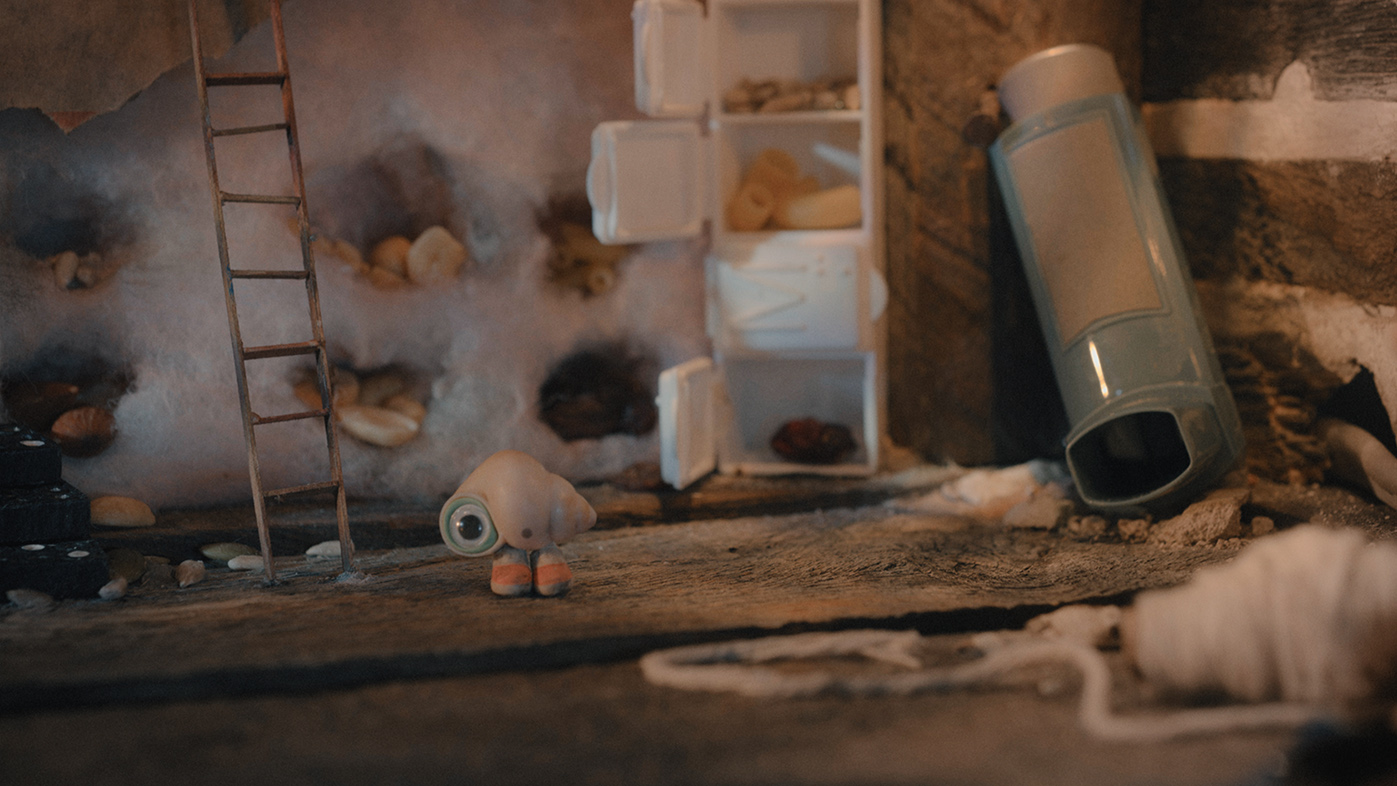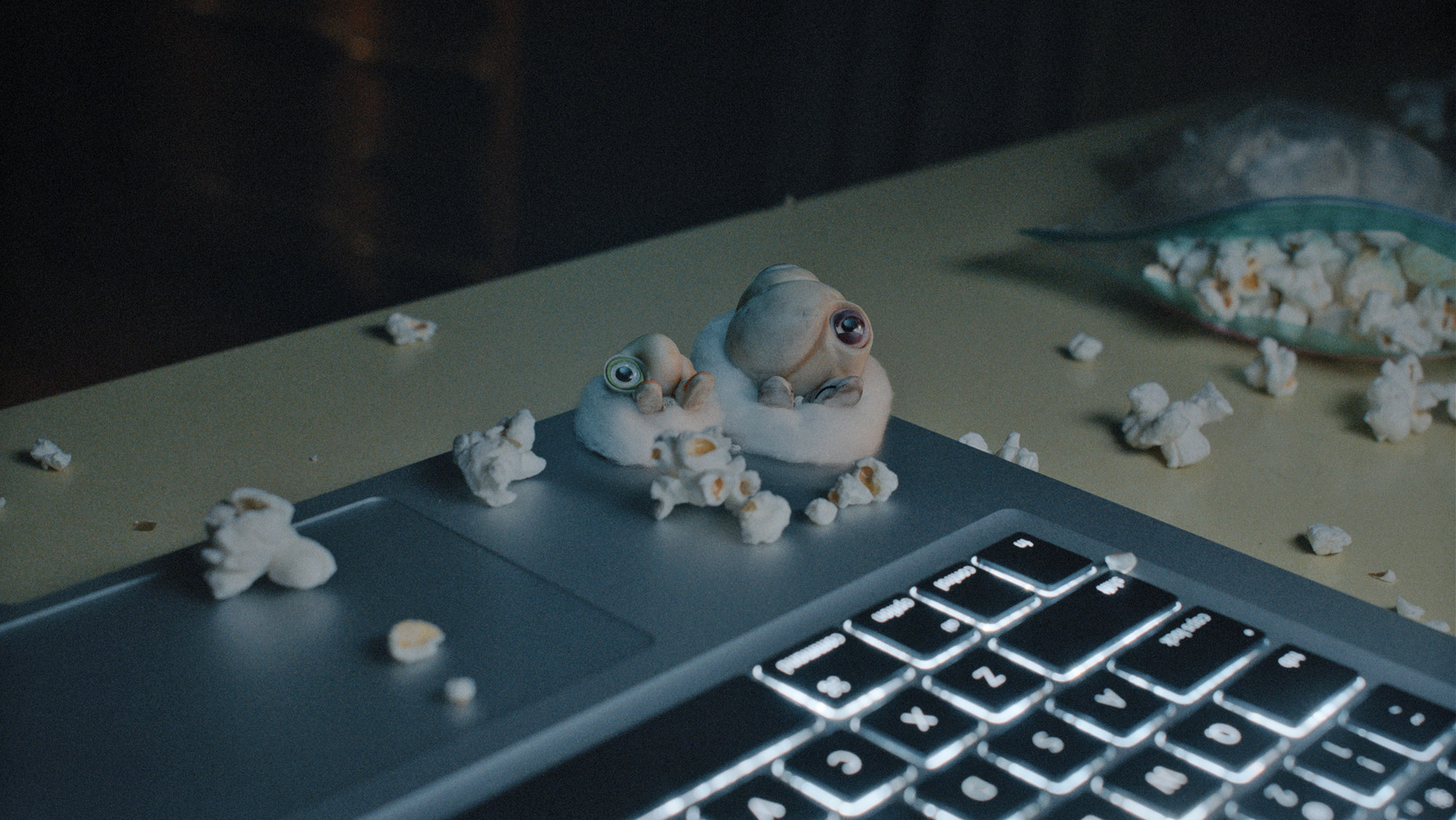The Smaller Picture: Itsy Bits of Life in Marcel the Shell with Shoes On

Critics Campus 2022 participant Isabelle Carney reflects on perspective, empathy and context, as depicted in Marcel the Shell With Shoes On.
Miniatures are replicas of something larger than themselves. On their own, they are simply scaled-down imitations. But in context, they can be units of possibility with limitless capacity for expansion.
In Marcel the Shell With Shoes On, in which tiny stop-motion characters interact with the live-action, life-size world, a piece of macaroni can be a bugle, a sewing pin becomes a sword and a tennis ball becomes a roving vehicle, even if it has no windows and occasionally ends up in the mouth of a dog. The challenge of imbuing these little items with meaning is one that the film confronts with a vigour and a playfulness that rewards our closest attention, as, in increments, these small, separate fragments build their own, microcosmic universe. A seashell with one googly eye and wisdom beyond his years, Marcel (voiced by actor and comedian Jenny Slate) articulates it best: “I’m not just one piece rattling around in this place,” he asserts. “I’m part of a whole.” Tiny can indeed be mighty.
Marcel positions us so that we can’t help but observe the lively potential in found objects. Significance that might have rolled like a marble into dusty household cavities is the movie’s playground. A dining area is made of bottlecap chairs; a day-of-the-week pill box turned on its side becomes a dry-goods pantry, one that houses a single craisin and some unsalted peanuts on each shelf. These thingamajigs and whoozeewhatsits serve as emblems of a delicately arranged domesticity summoned into being with impressive resourcefulness. They are pieces of waste repurposed with charm: joyful examples of making-do in a way that is not merely functional but inspired – and that’s how Marcel initially frames his philosophy. In Slate’s lilting, whispery child voice, he explains, “I want to … not just survive but have a good life.”
The desire to make the best of limited resources was born of an experience in a cramped hotel room in 2010, when Slate and her then-husband Dean Fleischer-Camp riffed on a made-up character who thrived in tiny spaces akin to the one they found themselves in. This character slept on a piece of bread and used pistachio shells as hats. This character had a piece of lint as a pet and dragged it around by a strand of dental floss. This character was Marcel, the product of a ‘yes, and’ practice – a tool of the improv comedian, doubtlessly familiar to Slate after having performed at the Upright Citizens Brigade and on Saturday Night Live.
Marcel began as an accretion of fanciful details and went on to generate a trio of short films, which gained over 32 million views on YouTube, and snowballed into a feature film directed by Fleischer-Camp and co-written by Slate, Fleischer-Camp, Elisabeth Holm and Nick Paley. The full-length work’s very existence is proof of its central thesis: that small, humble things have the potential for exuberant expansion.

Marcel the Shell With Shoes On
The tragicomic mockumentary begins when Dean (played by Fleischer-Camp) moves into Marcel’s house, a converted Airbnb, after separating from his wife. Dean is a documentarian who decides to film Marcel, which initiates the shell’s internet stardom. Marcel harnesses this as a last-ditch attempt to find his family, following a shattering event that separated him and his grandma Connie (another shell, voiced by Isabella Rossellini) from their ‘community’. The pair have been left to navigate their newfound isolation, despite being surrounded by relics of the extensive family they once had. Marcel carves portraits of his siblings, parents and neighbours into the back of a wooden dresser, a makeshift shrine of splinters and scratches. The film is nudged along by this quest for lost loved ones, a welcome source of momentum among its vignette-like ebbs and flows.
Yet the most tragic element of the story, and the boiling point of the film’s affecting pathos, is Connie’s evident dementia. After she suffers a bad fall, Marcel notes that “she has lost a small piece of a very large puzzle”. He keeps insisting that she’ll get better, but there is a sense of foreboding in his optimism, as we infer that his beloved grandmother’s recovery is unlikely, and further deterioration approaches. Rossellini’s voice performance is undoubtedly the most moving and convincing of the entire cast. She shoulders much of the film’s whimsy and elegance with a gentle but assured cadence that encompasses her character’s sweetness as well as her strength. One minute, she’s taking a bath in a teacup; the next, she’s uprooting vegetables 10 times her size with a tiny straw hat on her head. She nails the cute-but-cool persona, and it’s Connie’s determination in the end that mitigates the film’s tendency towards twee moments that might otherwise be read as maudlin.
As characters weave through the roles of caregiver and dependent, adult and child, each of them must negotiate how to move on after having lost a crucial part of their life. Maybe an adjustment in perspective is required in these cases of grief, when an absence seems too much to bear. Fleischer-Camp urges us not to fixate on what we’ve lost. There are little bits of life dwelling in familiar spaces, and they should not be overlooked.
In the opening sequence, as Marcel uses one of his inventive contraptions to shake fruit loose from a tree, a family of spiders can be seen, albeit briefly, observing the action from the spout of an outdoor drainpipe. This image, familiar from childhood nursery rhymes and kids’ TV shows, provides a new vantage point to consider. We have seen those spiders before, fashioning their homes in the folds of our curtains, lurking behind a ceiling fan, waiting for us to turn our lights off so that they can resume their spidery business. It is a quiet imperative to adjust our field of vision, insisting that if we linger on the smaller pieces of the puzzle, the larger picture will eventually become clear.
And so, from the film’s miniaturist yet strangely majestic perspective, nothing is beneath our regard – not the dust on the floors, not those hairs in the sink, not that smear of honey on the countertop. Nothing in Marcel the Shell With Shoes On is too tiny or too trashy to have meaning.